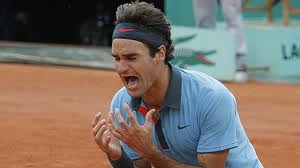Everyday performance measurement!
At the business school where I work, employee performance is, in terms of research and hype, a bit of a buzzword. The very idea of an individual or a company having a way to optimise a human seems to alone justify that individual's or company's existence.
Can we compare delivering anticipated levels on the tennis court, with that on the factory floor? Indeed, we can, because it is the same factors at work that are causing variations in tennis performance.

Fatigue - a major factor
Why might performance for a tennis player be evaluated differently than for a factory employee?
Generally speaking a factory employee isn't working at his maximum physical and mental capacity during his eight hour work shift. When a tennis player is in a match, normally he should be at the extremes of his powers, even in the easiest of matches. It is almost impossible to play a tennis match well, in your head saving your energy for a supposed next round. You have to give all you attentions to the match you are in now, and not save anything for later. Of course you know that you have reserves to also be able to perform later, but in every tennis match, a player will need to be "peaking".

Hard working
In the business world, the capacity of a human being to work, has, at least in the twentieth century, been measured in terms of a machine. If an assembly employee is at "normal" "average" levels he will perform, say, fifty successful operations per hour. In the business context, if the employee achieves this, he is considered to be operating at 100% levels. The fact that some operatives achieve more is largely irrelevant, because every employer knows that, even though he has choices to make at recruitment, he must respect a certain "averaging down" of a peak performance.
Is a tennis player like this too? Indeed. It is a much bandied around cliché, that the top players are those who achieve "above average" performance more frequently, even though their general capabilites, technical, physical or strategic, may seem to be very similar to another player.
The player at a lower level can take a reassuring message from this fact. We can assume that every player can perform like Federer. We could copy everything he does, including analyse and copy his ability to perform to excessively high levels frequently. In theory!

Aim to be a perfect player
Back to our factory floor employee. In the early days of the industrial revolution, a worker was exploited like a machine. He was measured to see how many successful tasks he could produce in a certain time, but frequently unrealistic demands were made. Workers were broken systematically, fired from their only means of gaining a living, if they could not maintain high levels indefinitely.
Even though the twentieth century saw more scientific measurement of performance, it was still based largely on maths, and very little on the specific physical and psychological criteria this employee needed to maintain a high level.

The psychology of performance
In the twenty-first century we have completed an immense cycle in the performance field. No longer is an employee expected to deliver "100% " "all of the time". He is allowed to have peaks and troughs. It is considered normal to be good on some days, bad on others. The employer is expected to admit an element of tolerance in his assessment of an employee's performance. He must demonstrate humanity.
Why have we come round (to the end of) an immense circle? Now the employee has a great deal of protection built into the workplace, to allow him to have "off" days, and to a certain extent, through absence from work, for example, take a certain responsibility for his own assessment of his potential performance on a certain day. He will continue to get paid!
Feeling under pressure?
Is a tennis player the same? Does he also have built in to the pro tour a system for him to have "off" days?
To a certain extent yes. A pro will defend his hard earned victory points from the previous year, in order to retain his acceptance for a level of tournament that will guarantee him an income. If he loses a few matches, he has a few "off" days, then a certain pressure will take over to catch up on other tournaments with superior performances to keep that level.
If a player has ambitions to reach new higher levels, he must take responsibility for clearly defined higher objectives. These goals may be set in practice, but it is in match play where he will be measured.
Test yourself in matchplay on tour
At the lower levels of professional tennis, at our levels, this manifests itself differently again. A player at junior "full-time" level is, for various reasons, a long way from being at maximum levels. He needs to learn as quickly as possible to keep to a minimum, and effectively to eliminate, the off days.
His technical and physical equipment will be better, more efficiently applied, and huge progress is possible in a short time. Hence players at this level need academy coaches to instill a "pro" routine into practice and matches. Very few players can acquire this routine naturally. It isn't difficult, but players simply can't do it! This gives tennis academies plenty of work!

Choice of tennis academy
Let's take a couple of examples. You're a beginner, worse, someone who has hardly participated in any ball games in his life. The coach takes you through the steps of how to find your contact points, how to shape your racket. This isn't such clever information, but the fact that a coach can do this is giving the power of his knowledge to the player. The beginner finds his contacts in a short time, and starts shaping his racket around the ball, controlling everything that is going on. The coach has given power to the player, power to deal with that ball , that situation, with the utmost control. The player becomes confident. He respects the coach for giving this power. An intelligent player knows that further power transferrals are coming from the coach, so he keeps coming for more.
What about the seasoned match player? I'll take one of my squad players who was only on the squad for a few weeks. In fact he had a far longer relationship with coaches that he had with his academy back in England. Initially he came to workouttennis.com because he didn't get enough tournament tennis in his programme from the academy. The workouttennis.com coaches were working with a player who already knew a lot about himself, the things that he should be doing on the tennis court. He had been well coached, and he was an easy player to coach. He trained hard and was always competitive in match situations with colleagues and unknown adversaries. How can any further power be transferred to such an experienced squad and match player?
When a teacher receives a good pupil he jumps for joy. A good pupil is used to using teachers, used to taking information from them, and profiting from it. What happens if he is near to the peak of his receptive, or power-acceptance , capabilities? The coach may say, I can't help you any more. You're on your own.
With experienced coaches though, the player is never there. If a coach says he cannot help the player any more, which he may honestly do, he is effectively getting ready to get fired. However, a player can challenge the coach. He may say, you can't teach me much more than I already know, but I need your support and preparation to get hrough my next tournament. The coach is back in work again. He doesn't have to deliver any extravagant instructions, he just needs to be there. Once again power is being transferred. The player has accepted that he values the moral and physical support of a coach, an authority figure that he respects. The teamwork will continue.
How can the coach transfer any power in this situation? His "knowledge" is no longer an essential ingredient. This relationship has reached a different phase. Where the beginner needed technical advice and practical exercises to become empowered, the tournament player needs structure. If the player were on his own, managing his own training, trainings partners, his schedule, his tennis communication and feedback, and goals, he is overloading himself. He needs to give these "little" jobs to someone trusted. The player needs a companion , a personal assistant, a guru, to continue a journey that will take him who knows where. That's why a player like Federer needs a coach. They don't talk technique much. Neither strategy, nor programming either. Why? Because they both know, after years of experience that what they are doing works. Continue along this route. The coach does still have an essential role to play, and that is to "communicate" with his experienced tournament player. He needs to prepare his mind, give him smaller challenges more by subtle changes in tone and dialogue, than by any direct hard and fast rules.
The final illustration is to simply establish why we need empowerment . When a tennis player is in a high pressure situation, he needs to master his thoughts and emotions. This, like a lot of things, isn't easy, and certainly varies from person to person. The goal is empowerment, because we want any player, beginner, or touring professional, to be at the maximum of his powers for his experience and skills level for any day. By feeling that power, the player develops the mental strength to confront any situation, even unknown ones. In this tennis environment there are few rules and controls. There is an acceptance of the conditions, and optimalisation of preparation and execution to deal with the conditions. The player is empowered.
Five of our most popular pages
. tournament win
. finding a sponsor
. the touring pro
. the master at work
